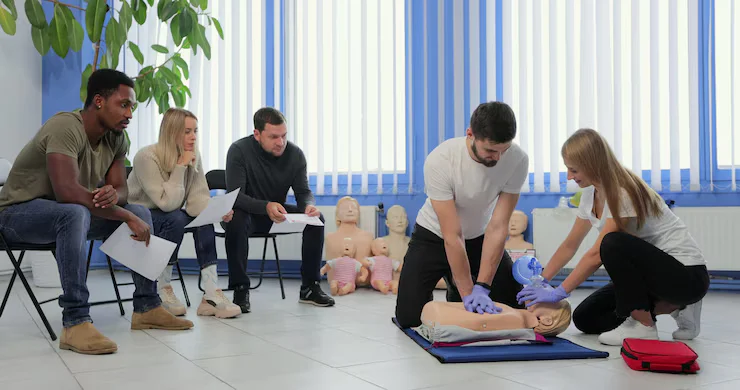When it comes to ensuring the safety and well-being of children in schools and childcare centres, having trained staff ready to handle emergencies is crucial. Accidents and health-related incidents can happen at any time, and a well-prepared team can make a significant difference in how a situation is managed. So, it’s important that schools and childcare centres get first aid training that is tailored to their needs, giving them the information and skills they need.
Why Schools and Childcare Centres Need Specialised First Aid Training
Children are naturally active, curious, and prone to accidents. It is important to have the right training for everything from minor injuries like cuts and bruises to more dangerous ones like allergic reactions, asthma attacks, or seizures. Schools and childcare centres are places where kids interact, play, and sometimes take risks. In such environments, the likelihood of incidents requiring first aid is higher, making it vital for educators and carers to know how to act quickly and efficiently.
Tailored first aid training courses are designed to equip teachers, childcare workers, and staff with the skills needed to handle these situations confidently. These courses go beyond basic first aid principles and focus on the specific needs of children. For example, they cover childhood illnesses, CPR for infants and young children, managing choking incidents, and how to handle common injuries in a school or daycare setting.
How Tailored First Aid Training Benefits Staff and Children
Staff are better prepared to handle a wide range of emergencies if they take a first aid course created just for schools and child care centres. This training will help both the staff and the kids they care for in these ways:
Early Intervention and Immediate Care
A quick response is crucial in any emergency situation. Having staff members trained to provide first aid ensures that children receive immediate attention when accidents happen. Early intervention can be life-saving, particularly in situations involving choking, severe bleeding, or anaphylactic reactions.
Managing Chronic Health Conditions
A lot of kids in schools and daycares may already have health problems like asthma, diabetes, or serious allergies. Tailored first aid training teaches staff how to manage these conditions effectively. For instance, staff will learn how to use an epinephrine pen for allergic reactions or how to administer CPR to a child experiencing a seizure.
Building Confidence in Staff
When staff are well-trained, they feel more confident and capable in handling emergencies. This confidence translates into calm and efficient actions during high-stress situations. The knowledge gained from a first aid course enables staff to react decisively, providing reassurance not only to the children but also to their parents.
Creating a Safe Learning Environment
A safe environment is critical for children’s development and learning. By ensuring that first aid-trained staff are always present, schools and childcare centres create a safe atmosphere where children can engage in activities without the constant worry of what might happen in the event of an emergency.
Peace of Mind for Parents
Parents entrust their children to the care of schools and childcare centres, and they expect that their children will be safe and well cared for. Having staff trained to provide first aid gives parents peace of mind, knowing that their children are in good hands, especially in emergencies.
What Does Tailored First Aid Training Involve?
Tailored first aid training courses for schools and childcare centres are comprehensive and hands-on, covering a variety of critical skills. These courses typically include:
- CPR for Children and Infants: Teaching how to perform CPR on infants and children, including chest compressions, rescue breaths, and using an AED (Automated External Defibrillator) if necessary.
- Managing Choking Incidents: Techniques for relieving airway obstructions in young children and infants.
- Basic First Aid for Common Injuries: Treating cuts, burns, sprains, fractures, and head injuries common in the school and childcare setting.
- Allergy and Asthma Management: Recognising the signs of severe allergic reactions and using an epinephrine auto-injector, as well as managing asthma attacks.
- Dealing with Seizures: Knowing how to respond to and manage seizures in children, and how to safely administer first aid during such episodes.
Conclusion
Getting schools and childcare centres customised first aid training is not just a safety measure; it is an important step to make sure that children are safe and healthy. A first aid course designed for the unique needs of these environments provides staff with the knowledge and confidence to handle emergencies effectively. By being able to provide first aid when it’s needed most, schools and childcare centres can safeguard the health of their students and reassure parents that their children are in good hands.







